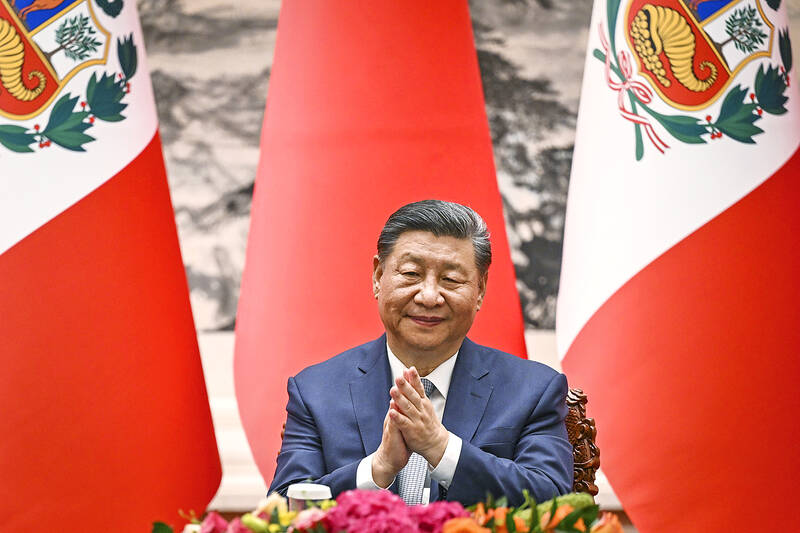Chinese President Xi Jinping (習近平) yesterday said that the Chinese Communist Party was planning and implementing “major” reforms, ahead of a political conclave that is expected to put economic recovery high on the agenda.
Chinese policymakers have struggled to reignite growth since late 2022, when restrictions put in place due to the COVID-19 pandemic were lifted.
The world’s second-largest economy is beset by a debt crisis in the property sector, persistently low consumption and high unemployment among young people.

Photo: AP
Policymakers “are planning and implementing major measures to further deepen reform in a comprehensive manner,” Xi said in a speech at the Great Hall of the People in Beijing. “We will ... form a more market-oriented, legal and international business environment.”
“China’s door will only open wider and wider, and will never be closed,” he added.
Xi has touted the promise of significant reform several times this year and the government has already enacted measures in key sectors such as real estate to try to address critical issues.
On Thursday, it was announced that the delayed Third Plenum — a meeting historically watched for signals on economic policy direction — would take place in Beijing in the middle of next month.
The key meeting of top officials, originally expected last year, is highly anticipated in the hopes it might resolve the uncertainty that has weighed on China’s economy.
The People’s Bank of China later yesterday pledged to “promote the implementation of the financial policies and measures already issued, and push for the stable and healthy development of the real-estate market.”
It would “promote the accelerated construction of a new model for real estate development,” the central bank said in a statement.

A Ministry of Foreign Affairs official yesterday said that a delegation that visited China for an APEC meeting did not receive any kind of treatment that downgraded Taiwan’s sovereignty. Department of International Organizations Director-General Jonathan Sun (孫儉元) said that he and a group of ministry officials visited Shenzhen, China, to attend the APEC Informal Senior Officials’ Meeting last month. The trip went “smoothly and safely” for all Taiwanese delegates, as the Chinese side arranged the trip in accordance with long-standing practices, Sun said at the ministry’s weekly briefing. The Taiwanese group did not encounter any political suppression, he said. Sun made the remarks when

The Taiwanese passport ranked 33rd in a global listing of passports by convenience this month, rising three places from last month’s ranking, but matching its position in January last year. The Henley Passport Index, an international ranking of passports by the number of designations its holder can travel to without a visa, showed that the Taiwan passport enables holders to travel to 139 countries and territories without a visa. Singapore’s passport was ranked the most powerful with visa-free access to 192 destinations out of 227, according to the index published on Tuesday by UK-based migration investment consultancy firm Henley and Partners. Japan’s and

BROAD AGREEMENT: The two are nearing a trade deal to reduce Taiwan’s tariff to 15% and a commitment for TSMC to build five more fabs, a ‘New York Times’ report said Taiwan and the US have reached a broad consensus on a trade deal, the Executive Yuan’s Office of Trade Negotiations said yesterday, after a report said that Washington is set to reduce Taiwan’s tariff rate to 15 percent. The New York Times on Monday reported that the two nations are nearing a trade deal to reduce Taiwan’s tariff rate to 15 percent and commit Taiwan Semiconductor Manufacturing Co (TSMC, 台積電) to building at least five more facilities in the US. “The agreement, which has been under negotiation for months, is being legally scrubbed and could be announced this month,” the paper said,

MIXED SOURCING: While Taiwan is expanding domestic production, it also sources munitions overseas, as some, like M855 rounds, are cheaper than locally made ones Taiwan and the US plan to jointly produce 155mm artillery shells, as the munition is in high demand due to the Ukraine-Russia war and should be useful in Taiwan’s self-defense, Armaments Bureau Director-General Lieutenant General Lin Wen-hsiang (林文祥) told lawmakers in Taipei yesterday. Lin was responding to questions about Taiwan’s partnership with allies in producing munitions at a meeting of the legislature’s Foreign Affairs and National Defense Committee. Given the intense demand for 155mm artillery shells in Ukraine’s defense against the Russian invasion, and in light of Taiwan’s own defensive needs, Taipei and Washington plan to jointly produce 155mm shells, said Lin,